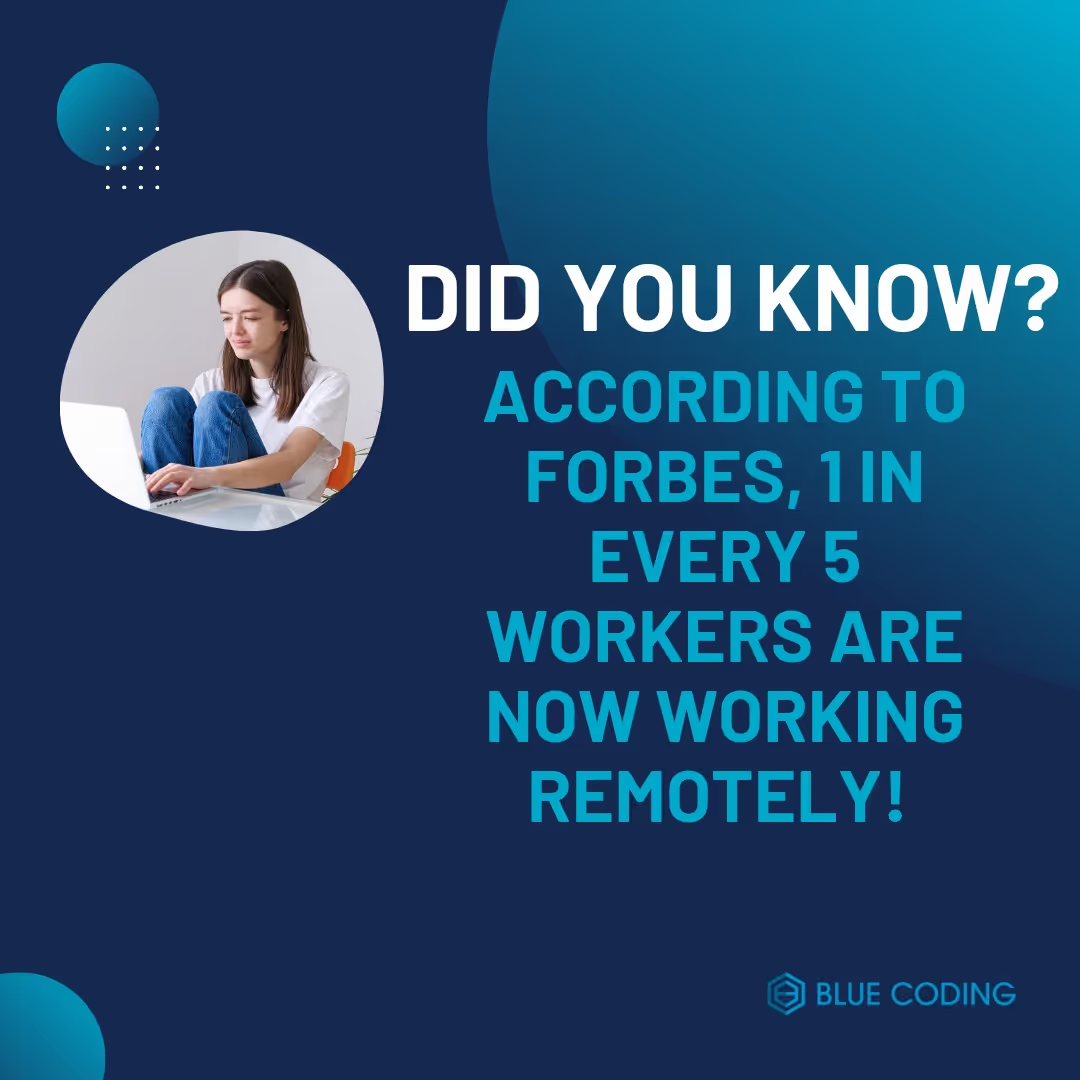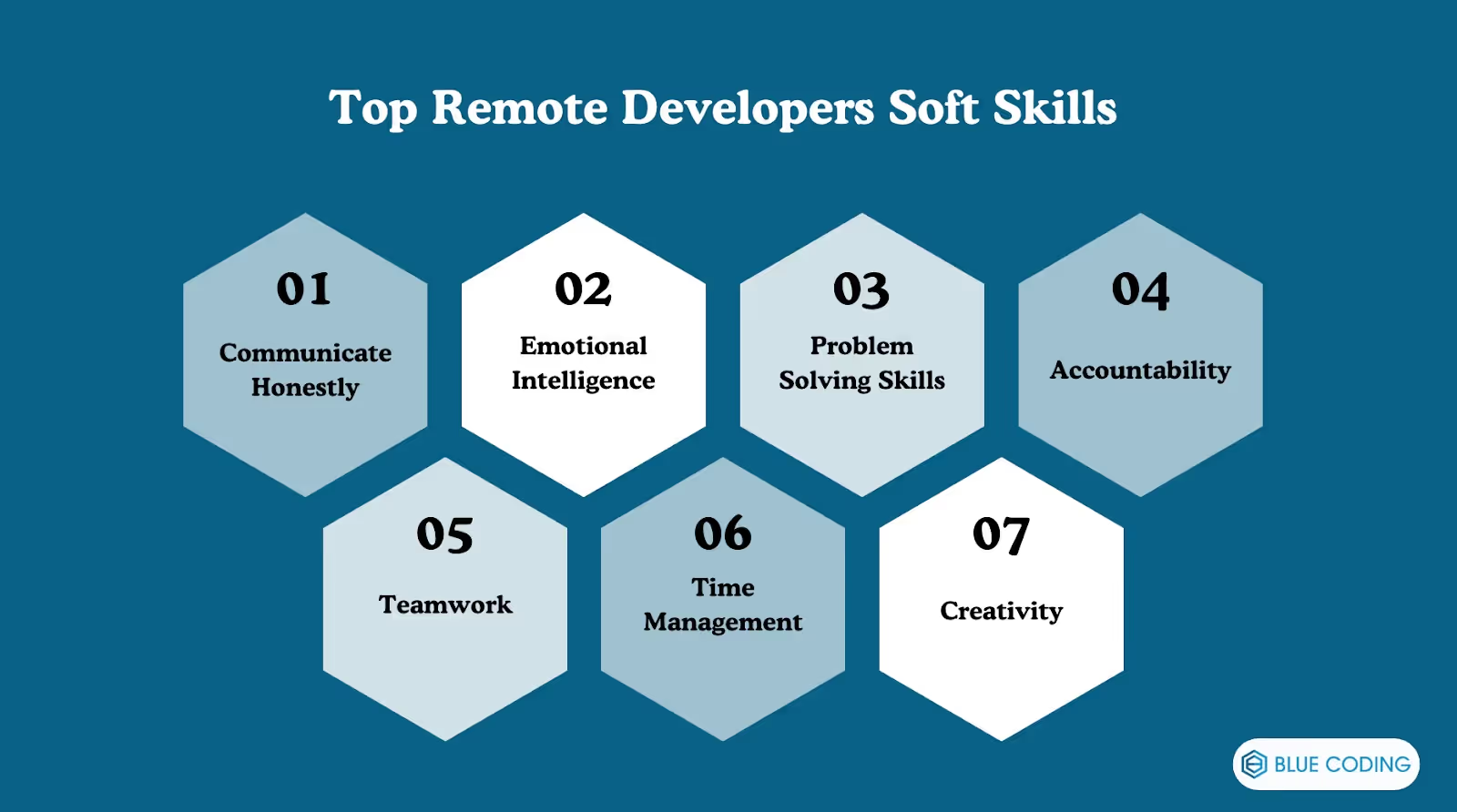If a person wants to ace in any career, the key is to become expert in the target skill. This can be done by enrolling in relevant certificate programs or by simply practicing enough to be professional when it comes to using the skills. This also applies to those who want to become software developers, whether it is for in-house positions or remote work. There are numerous skills that, if a developer is able to achieve and become a professional at, it will help them in achieving more success and in excelling further in their career. Through this article, Blue Coding aims to help software developers understand the top remote developers’ soft skills. You can also check out our blog post on the top remote developer tools!
Individual and non-specialized abilities, such as how you interact and navigate your work environment, are what soft skills refer to. Skills required to work are more about how one behaves than the distinct profession or task they specialize in. This includes traits such as adaptability, emotional intelligence, problem-solving, and communication. Efficient team dynamics, leadership, and collaboration are fostered by soft skills, designing them extremely transferable across diverse industries, and thus critical for success in any occupational setting.
Soft skills are important in any career because they shape how you interact with others and handle challenges. For remote software development experts, these skills are even more vital since you don’t have the benefit of in-person interactions. Being able to communicate clearly, manage your time, and stay accountable builds trust with your team, especially when you're working from different locations. Soft skills also help you adapt to unexpected problems and collaborate smoothly with colleagues across time zones. In a remote setting, your technical skills might get you the job, but it’s your soft skills that will keep things running smoothly and help you succeed in the long run.


Honest communication is the primary key to success for any remote developer. When you’re miles apart from your team, transparency becomes key. Remote work eliminates those casual office check-ins, so clear, upfront conversations build trust. Being open about challenges or uncertainties avoids misunderstandings that can derail a project. Whether discussing timelines, sharing updates, or addressing obstacles, honesty fosters a collaborative environment where everyone feels secure. It’s also essential for creating genuine relationships, where your team knows they can rely on your word, and vice versa.
Working remotely means you won't always have face-to-face interactions to sense the mood of your colleagues. That’s where emotional intelligence comes into play. It’s about understanding not only your emotions but also how your words and actions impact others. Strong emotional intelligence helps remote developers navigate different personalities and cultures, making them adaptable in global teams. By being empathetic and staying in tune with the feelings of others, you can foster better collaboration, even through screens. Plus, it equips you to handle stress gracefully, which is crucial in a remote setting where communication can sometimes be tricky.
In remote software development environments, developers often face unexpected challenges with technology or collaboration tools. Problem-solving skills ensure you stay cool-headed and efficient when issues arise. Remote developers should be able to independently assess a problem, consider multiple solutions, and implement them without waiting for constant guidance. Problem-solving also extends beyond technical issues to interpersonal challenges, such as coordinating with team members across different time zones or adapting to new project management tools. The ability to think critically and navigate obstacles creatively can set a developer apart in a remote setting.
When you’re working from home, there’s no manager physically checking in on your progress. Accountability becomes an essential soft skill for remote developers. It’s about owning your tasks and delivering on promises without needing constant supervision. This includes being proactive in updating your team, meeting deadlines, and acknowledging any delays before they become issues. A strong sense of accountability ensures that others can trust you to follow through, which is crucial when your team depends on your individual contributions to move projects forward smoothly.
Even though remote work can sometimes feel like a solitary activity, teamwork remains one of the most important soft skills. A successful remote developer knows how to collaborate effectively with others, even when separated by time zones or continents. This means contributing to discussions, offering support when team members need help, and being open to feedback. It’s also about understanding the balance between individual responsibility and collective success, ensuring that your actions positively impact the whole team. Building strong relationships through teamwork helps create a sense of community, even in a remote setup.
Without the structured environment of an office, managing your time effectively is a crucial skill for remote developers. With distractions at home and flexible schedules, it's easy to lose track of time or let tasks pile up. Strong time management ensures that you prioritize your work, meet deadlines, and avoid last-minute scrambles. It also helps maintain a healthy work-life balance, preventing burnout in the long run. Good time management involves setting realistic goals, sticking to routines, and being mindful of how much time you dedicate to specific tasks, ensuring productivity stays high.
Creativity isn’t just for designers; remote software development experts need it too. Whether it’s finding innovative ways to solve coding problems or brainstorming fresh approaches to collaboration, creativity helps remote developers stay ahead. Working in isolation can sometimes limit exposure to spontaneous ideas, but being open to new perspectives and willing to experiment can keep things fresh. A creative mindset enables you to approach challenges from different angles, sparking solutions that might not be obvious at first glance. It also encourages continuous learning and adapting, which is vital in an ever-evolving tech world.
As a nearshore outsourcing agency, aside from providing remote developer tips, Blue Coding also creates a safe and productive work environment for our remote developers. We understand that software development can be sometimes challenging and needs focus, hence we encourage developers to work from home and thus, provide work from home opportunities for them. If you are interested in working with us, we would love for you to check out our open vacancies and apply to any that are relevant to your experience. If you have any queries, feel free to contact us as well!
Subscribe to our blog and get the latest articles, insights, and industry updates delivered straight to your inbox